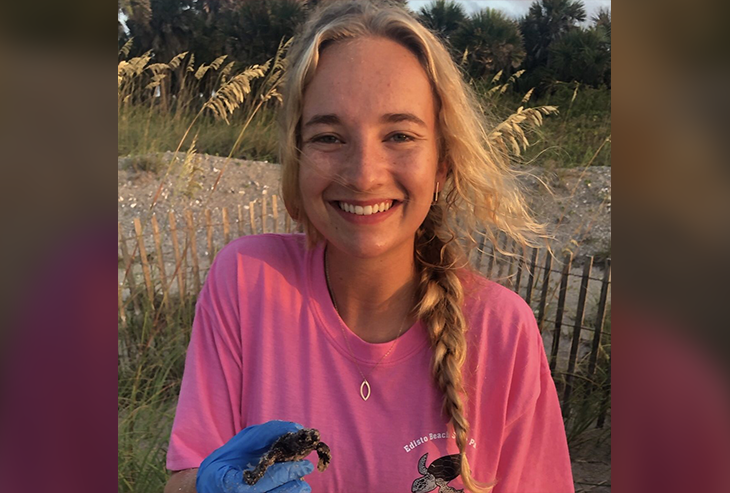A Lumen Scholar and Goldwater Scholar, Crain spent the summer at Edisto Beach State Park in South Carolina researching loggerhead sea turtle nests.
Elon University senior, Lumen Scholar and Goldwater Scholarship recipient Ashlyn Crain ’22 recently completed her three-month internship at Edisto Beach State Park in South Carolina, spending the summer as a “sea turtle intern.”
The internship was split into two aspects – conservation and education. With the conservation portion of the internship, she conducted daily dawn patrols, surveying a mile-and-a-half long beach for any new sea turtle nests, taking eggs samples for a genetic study done at the University of Georgia and performing inventories of hatch nets.

The education side saw her leading public inventories and night walk programs, where she and a group of volunteers would give a presentation on sea turtle development, what it looks like for them to come up on the beaches and watch a sea turtle nest.
Crain said it was this night walk program that was the most rewarding for her. To see the reactions of the people experiencing this for the first time and that they were genuinely interested in something that she is passionate about was very gratifying.
“I am a big advocate for education of conservation and so it was really cool to have groups of 30-plus people that we would be taking on the beach with us and getting to experience a loggerhead sea turtle nest for the first time,” she said.
After discovering the Edisto Beach State Park internship through a job board with a wide database for wildlife positions and internships, she applied one day, was interviewed for the opportunity the next, and then was accepted into the program the following week.
“I actually had another internship that had been canceled because of COVID reasons,” Crain said. “So, it was a frenzy in April of trying to find something and this just really landed in my lap, and it was the perfect opportunity.”
In 2020, Crain was selected as one of the 15 Lumen Scholars for her project, “Mitigating carbon emission: Four strategies for sequestering atmospheric CO2 in trees.” The research for that project is still ongoing and Crain, along with her faculty mentor associate professor of biology David Vandermast, plans to complete that research before she graduates.
The research looks at four different types of forest and trees planted in cities on how they are deploying carbon directly from the atmosphere in those locations. The research is done through a partnership with Duke University’s Carbon Offsets Initiative and so far, there have been hundreds of trees planted on the streets of Durham.
Crain said that it’s been interesting to see how naturally occurring systems such as old-growth forests, such as Elon University Forest, can guide how trees are planted in cities to deploy carbon in urban environments.
“It’s really been interesting to apply how these systems that are naturally happening in old-growth forests and forests like you would see at the Elon University Forest can have an effect on how trees planted in cities are deploying carbon directly from the atmosphere in those locations,” Crain said.
Growing up in the mountains of Tennessee, she wanted to apply her childhood interests to her future. “I came into Elon really wanted to go into the forestry side of service and industry and really fell in love with the topics that I was learning about in classes like biodiversity and population biology,” Crain said.
But since then, her interests have shifted more to coastal ecology which is still relevant to carbon cycling. Having grown up in the mountains, that was the ecosystem that initially piqued her interest.
“But I was able to take a wetland ecology class and an aquatic biology class both under Dr. Brant Touchette and I think that was really the first opportunity I had to understand coastal systems in a deeper way than I had before,” she said.
Going forward, Crain is narrowing down her options post-graduation. She is currently looking into graduate programs and various labs in which she could see herself getting her master’s degree or doctorate. She said she’s also open to taking a seasonal position and gaining some real-world experience before school.
Whichever avenue she decides, she would love to continue researching and educating.
“I definitely want to stay in the realm of research, that’s something that I really enjoy and I’m passionate about. But then I also love education, so I’m looking for something that can really combine those two passions of mine,” she said.



